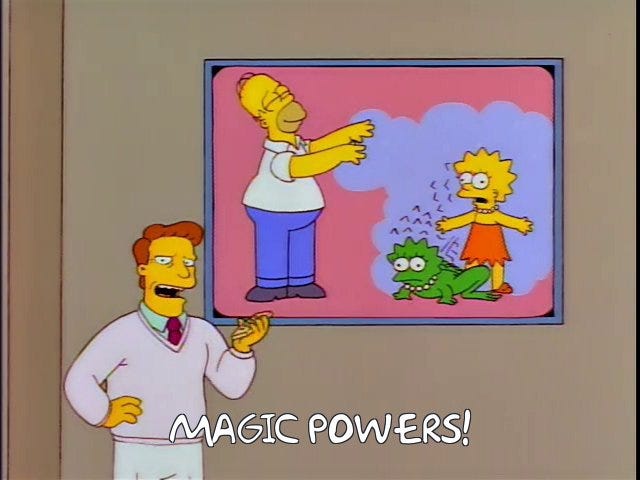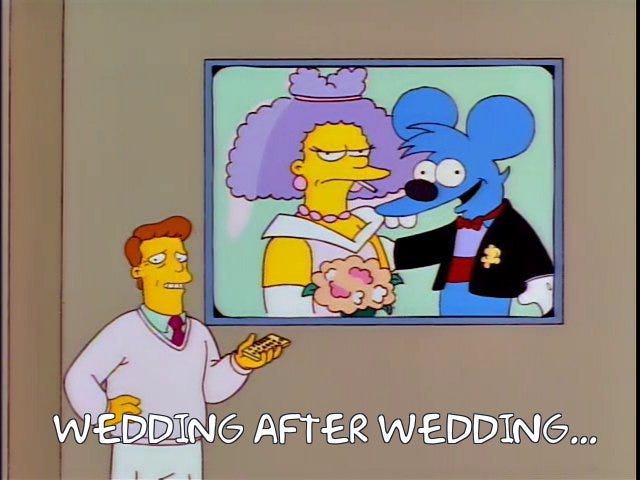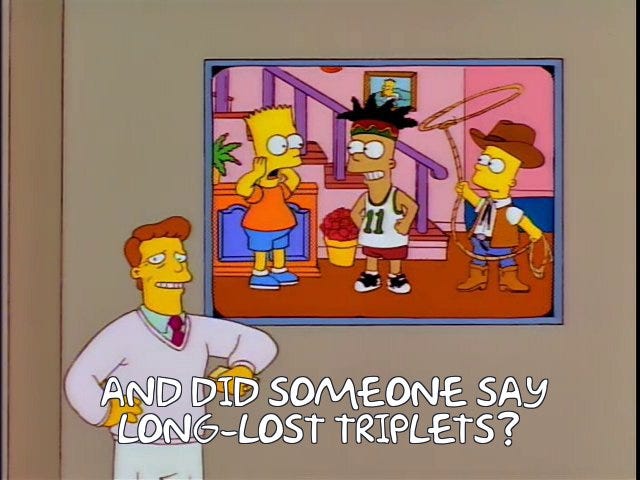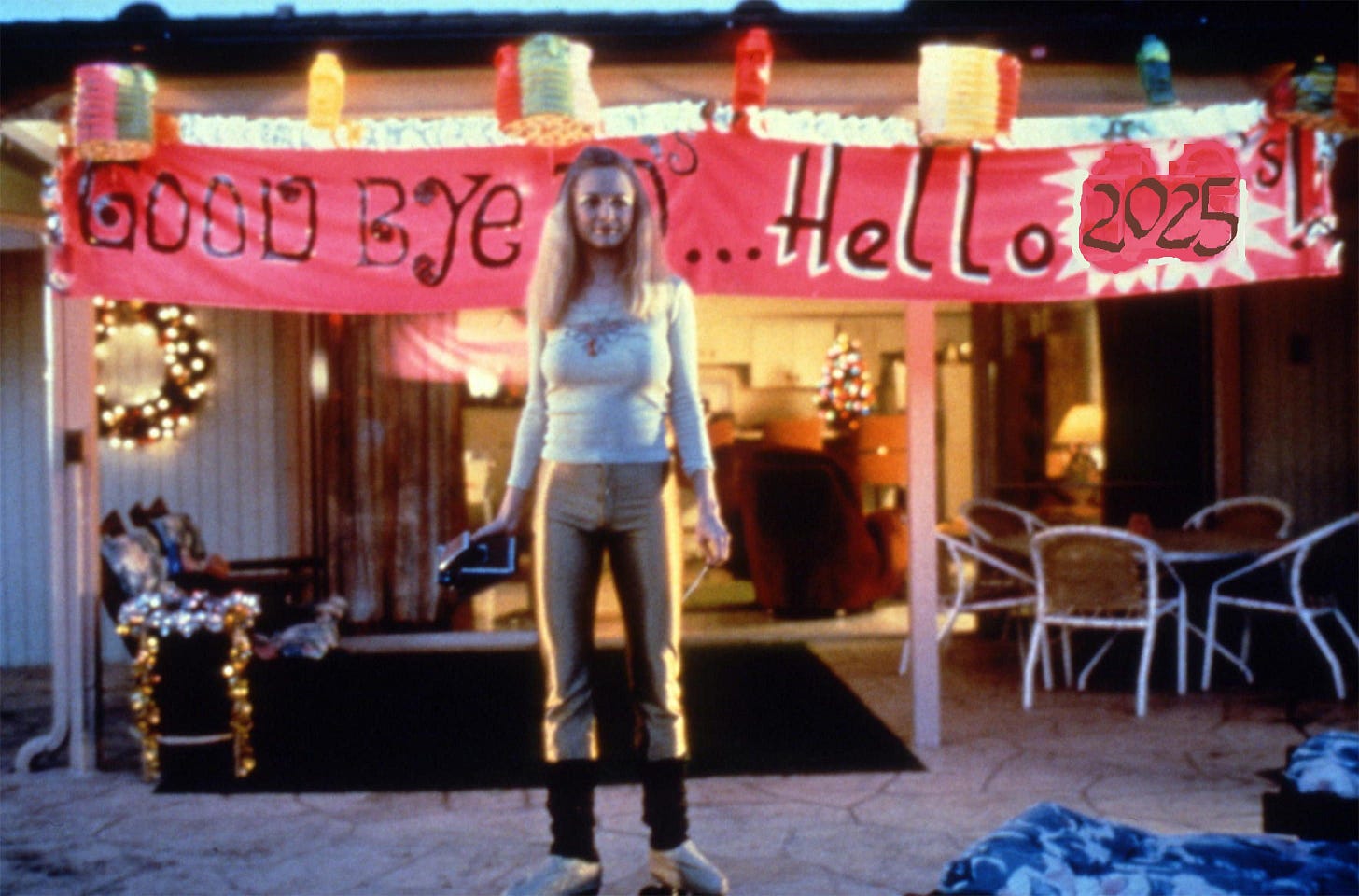My plans for this newsletter in 2025
I encourage you to stick with me but all good if not, ha ha
When I launched my Substack in September 2024, I was fresh out of a job that had taken its toll on my mental health and had a surplus of emotional energy that I needed to channel into something. I love writing and intend to keep it up as much as possible even after I have to return to the conventional workforce (inshallah not central government). It’s no coincidence that I started with a series of pieces on 31 Days of Horror which was the perfect way to force myself into a routine, starting with a sprint before settling into an easier pace.
At that time, I was thinking a lot about the concept of ‘one for you, one for me’. This used to be a philosophy that filmmakers adopted where they’d alternate money-making movies for the studio with more personal passion projects1. The idea was that I’d roughly stick to a pattern in which one week I’d write about politics (i.e. what most of you subscribed to read) and the next week I’d write about one of my own weird little special interests (usually film). One should always ask themselves about who a certain piece of writing is for and for anyone with interests as eclectic as my own, this could be a broad range of different people. I also think it’s OK for artists to make something that’s only for themselves (I still get shit about my rodent article for the Spinoff, which I stand by even if nobody read it) but you’ve got to be realistic about how wide the appeal is.
The reason I raise this is that I know a number of people subscribed to hear my reckons about the public sector specifically. As I get further and further from that life, there may be less for me to say. I won’t be offended if anyone unsubscribes and if you’ve paid and want to be reimbursed then get in touch!
However, even if I release more pieces in 2025 about the movies (with hints of activism, geopolitics and rodents) and fewer about lanyards and protected disclosures, my writing is still going to be political. I’m coming at this from an inherently left-wing, anti-racist, pro-union perspective and that’s always going to inform what I write. It’s physically impossible for me to write about Captain America: Operation Paperclip without mentioning the political environment in which something like that gets made. This writing may also weave in experiences related to my time working for government even if that’s no longer the main area of focus.
So here’s what’s on tap for 2025:
As much as I can, continuing to release pieces at the start of every week about film, politics or whatever else I think you may be interested in.
Information about how you can get involved in actions, primarily in Te Whanganui-a-Tara, including submissions on bad legislation and things that groups like Justice for Palestine and Tiriti Action Group are up to.
Collaborations! I’m always going to support my homies at 1/200 and have also been talking to a mate about a possible series on NZ cinema.
I’m on track to publish my first book this year and will hopefully use this platform to provide more information, maybe even preview some snippets.
Is there anything in particular you’d like to read? I work well when I have direction and constraints and would welcome any suggestions.
Also full disclosure: I haven’t hidden any of my posts behind a paywall yet. I know some of you are supporting me financially (and you have no idea how grateful I am to each of you) but I’m still at the stage where I want to write for as many people as possible. I will communicate clearly and transparently if this ever changes!




In other news…
For anyone in Te Whanganui-a-Tara, my friends at 5ever books are running a community art space for the next few days: the Whatever Palace at 113 Taranaki Street. You should check it out regardless but it’d be remiss of me to not mention my own event.
At 6pm tomorrow, 14 January, I’m hosting a screening of Isao Takahata’s Pom Poko. Takahata is one of my favourite filmmakers of all time and I think about this movie every day. The main reason I picked it though is that it’s one of the best depictions of activism and organising ever made. Like his more famous work husband Hayao Miyazaki, Takahata has a background as a union organiser and themes like activism and environmentalism were always at the forefront of his work. There are films like The Battle of Algiers, Patu!, even How to Blow Up a Pipeline that are excellent procedural depictions of direct action but what Takahata nails is the emotions involved in activism, including how it feels when that activism fails.
Also, if you haven’t submitted on the Regulatory Standards Bill, you have until midnight! The best summary of resources I’ve seen on this has been compiled by Melanie Nelson here.
Ngā mihi nui
ur boy jc
Today, this approach is becoming increasingly untenable and the demands of capitalism mean that it’s harder than ever for artists to make something good after they ‘sell out’. Barry Jenkins was one of my favourite directors of the last decade and I’m terrified that he’s never going to make anything worthwhile again after Mufasa.
I am increasingly sympathetic to the following quote from Soviet filmmaker Andrei Tarkovsky:
The man who has stolen in order never to thieve again remains a thief. Nobody who has ever betrayed his principles can have a pure relationship with life. Therefore when a film-maker says he will produce a pot-boiler in order to give himself the strength and the means to make the film of his dreams—that is so much deception, or worse, self-deception. He will never now make his film.






